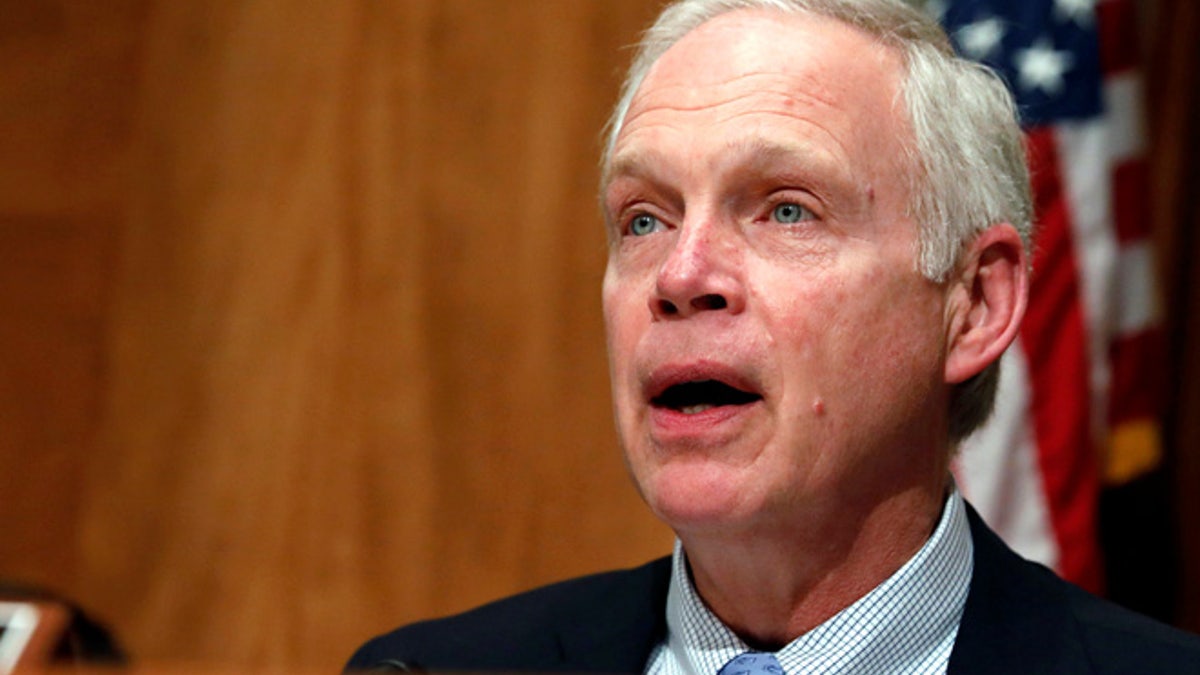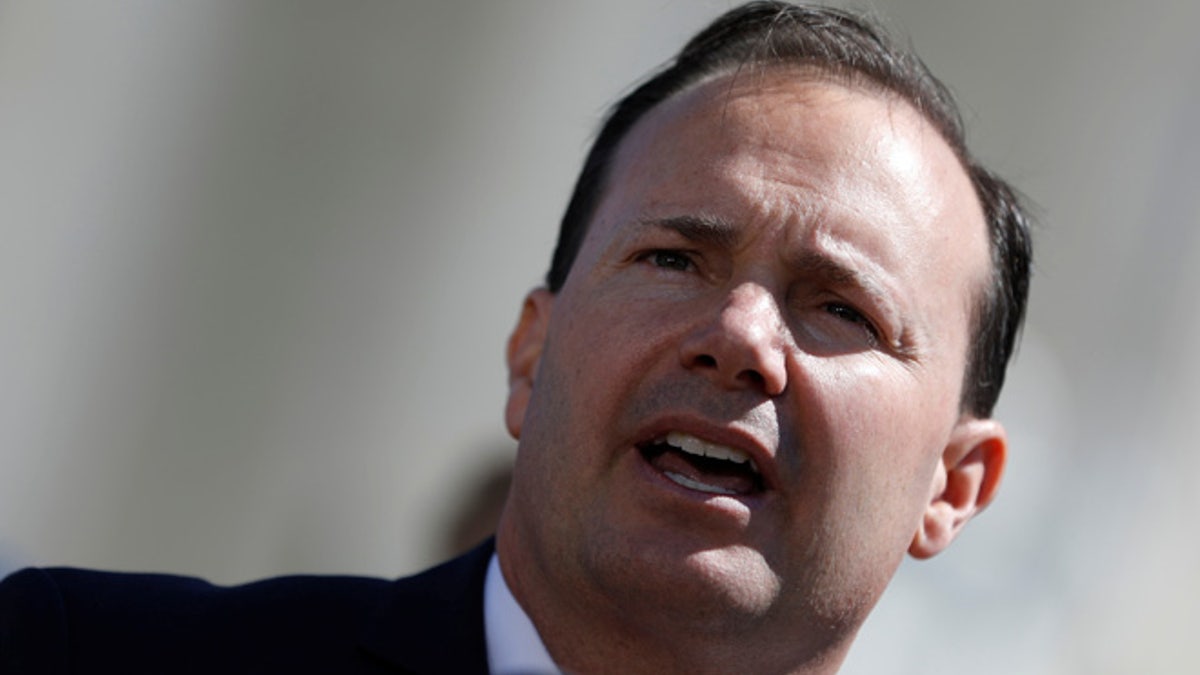Senate healthcare reform plan faces opposition from GOPers
On 'Special Report,' Mike Emanuel breaks down the reaction and the key differences from the House Republican bill
Another Republican senator came out against the GOP health care plan on Friday, making it nearly impossible for the package to pass the chamber in its current form.
Sen. Dean Heller, R-Nev., said on Friday that the bill is "simply not the answer," joining Republican Sens. Rand Paul, R-Ky., Ted Cruz, R-Texas, Mike Lee, R-Utah, and Ron Johnson, R-Wis., in opposition.
"My point is this bill currently in front of the United States Senate is not the answer--it is simply not the answer," Heller said at a press conference in Nevada on Friday. "I am announcing today that in this form I will not support it."
Heller and Cruz are both up for re-election in 2018.
Senate Majority Leader Mitch McConnell, R-Ky., who rolled out the legislation on Thursday, needs 50 votes to pass the bill to the House, with Vice President Mike Pence serving as the tie-breaking vote. But without the support of Paul, Cruz, Lee, Johnson, and now Heller, passage of the bill in its current form will be nearly impossible, unless Republicans can manage to draw Democratic votes, which is highly unlikely.

FILE: In this March 15, 2011 file photo, Rep. Dean Heller, R-Nev. is seen in his office on Capitol Hill in Washington. Nevada Gov. Brian Sandoval has named Heller to replace John Ensign in the U.S. Senate. (AP)
"Currently, for a variety of reasons, we are not ready to vote for this bill, but we are open to negotiation and obtaining more information before it is brought to the floor," the joint statement from Cruz, Paul, Johnson and Lee said on Thursday. "There are provisions in this draft that represent an improvement to our current health care system but it does not appear this draft, as written, will accomplish the most important promise that we made to Americans: to repeal ObamaCare and lower their health care costs."

U.S. Senator Rand Paul (R-KY) and other members of the House Freedom Caucus hold a news conference on Capitol Hill in Washington, U.S. March 7, 2017. REUTERS/Eric Thayer - RTS11VNS (REUTERS)
Paul told reporters on Capitol Hill Thursday that if members who support the bill know they don't have the votes needed, discussion would begin earlier.

Chairman Senator Ron Johnson (R-WI) speaks prior to Homeland Security Secretary John Kelly testifying before a Senate Homeland Security and Governmental Affairs hearing on border security on Capitol Hill in Washington, D.C., U.S., April 5, 2017. REUTERS/Aaron P. Bernstein - RTX348HM (REUTERS)
"I didn't run on ObamaCare lite," Paul said. "I think we can do better than this --my hope is not to defeat the bill, but to make the bill better."
Paul added: "Now the discussions begin -- I think it could take longer than a week."

Sen. Ted Cruz, R-Texas speaks at the 2014 Values Voter Summit in Washington, Friday, Sept. 26, 2014. Prospective Republican presidential candidates are expected to promote religious liberty at home and abroad at a gathering of evangelical conservatives, rebuking an unpopular President Barack Obama while skirting divisive social issues that have tripped up the GOP. (AP Photo/Manuel Balce Ceneta) (AP)
Cruz acknowledged that he had not yet had "the opportunity" to fully review the bill in its entirity, but said "there are components that give me encouragement and there are also components that are a cause for deep concern."
“I have been clear from day one that I want to get to yes,” Cruz told reporters on Capitol Hill Thursday. “Nobody has fought harder against ObamaCare in the Senate than I have, but we have to actually have legislation that fixes the underlying problem.”
Cruz said the current draft doesn’t do “nearly enough,” and would be a “disaster politically.” Cruz said that key components to “get everyone to yes” are lowering premiums, and giving the states flexibility.

Sen. Mike Lee (R-UT) speaks at a rally for nominee Neil Gorsuch outside the Supreme Court in Washington, D.C., U.S. March 29, 2017. REUTERS/Aaron P. Bernstein - RTX339ZH (REUTERS)
Senate Republicans released the 142-page draft of their version of a "repeal and replace" health care plan on Thursday titled, “Better Care Reconciliation Act of 2017,” which eliminates a majority of ObamaCare provisions, already drawing backlash from Senate Democrats, and even some congressional Republicans.
The bill could go to a vote as early as next week, after the Congressional Budget Office reviews and gives a score to the new plan, but McConnell did not announce a specific timeline for consideration. The Congressional Budget Office expects to have a score for the draft “early next week.”
The bill repeals key components of ObamaCare, and manages to maintain some "crucial" conservative items congressional Republicans were looking for, like a cut to Planned Parenthood funding.
GOP SENATORS UNVEIL OBAMACARE OVERHAUL
But despite the early GOP-opposition, Sen. Chuck Grassley, R-Iowa, said he’s “glad the process is moving forward.”
“The Senate discussion draft is available for everyone to review,” Grassley said. “There will be a full debate before the Senate, with the ability for senators of both parties to offer amendments.”
But Democrats, as expected, are slamming the bill—and most are hanging on comments made by President Trump earlier this week, suggesting the House bill, called the American Health Care Act, was “mean.”
“The President said the Senate bill needs heart, the President says the House bill was mean,” Senate Minority Leader Chuck Schumer, D-N.Y., said on the Senate floor Thursday after the bill was rolled out. “The Senate version is meaner—the House bill is a wolf, but this bill is a wolf with sharper teeth -- it’s a wolf in sheep’s clothing.”
At the White House, the president remained consistent in his comment from earlier in the week, and said he hoped to get “something done” with “heart.”
“We’d love to have some Democratic support, but they’re obstructionist,” Trump said. “Hopefully we’ll get something done and it’ll be something with heart and very meaningful.”
Sen. Bernie Sanders, I-Vt., said the bill is “even worse than expected” and called it “by far the most harmful piece of legislation I have seen in my lifetime.”
“Our job now is to rally millions of Americans against this disastrous bill to make sure it does not pass the Senate,” Sanders said.
Despite Sanders’, and other Democrats’ criticisms, Sen. Lamar Alexander, R-Tenn., said the bill makes “no change” in current law when it comes to “protecting people with pre-existing conditions.”
McConnell said on the Senate floor Thursday that Democrats “made it clear early on” that they “did not want to work with us,” but Sen. Ron Wyden, D-Ore., said he had “never been asked.”
“It is not just a fiction, it is a gross fiction,” Wyden said.
Still, many members have yet to read the 142-page legislation in its entirety, with some Republicans hesitant to “forecast” votes, prior to reading the bill in full.
WHAT'S IN THE SENATE PROPOSAL: KEY PROVISIONS OF BETTER CARE RECONCILIATION ACT OF 2017
“I don’t know,” Sen. Luther Strange, R-Ala., told Fox News. “We’ve got a lot of work to do.”
Sen. Susan Collins, R-Maine, already has “a number of concerns,” according to her spokesperson, and plans to read the bill in full.
“She has a number of concerns and will be particularly interested in examining the forthcoming CBO analysis on the impact on insurance coverage, the effect on insurance premiums, and the changes in the Medicaid program,” Collins’ spokeswoman Annie Clark said.
McConnell said that when legislation comes to the floor, it will present Senate Democrats “another opportunity to do what’s right for the American people.”
Fox News' Peter Doocy,Chad Pergram, Mike Emanuel, Jason Donner contributed to this report.













































